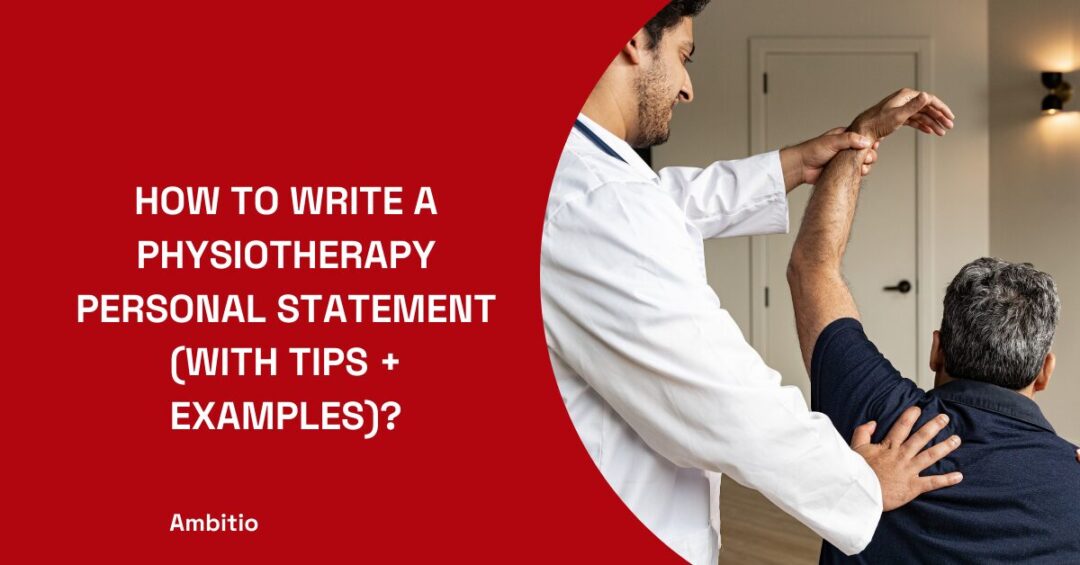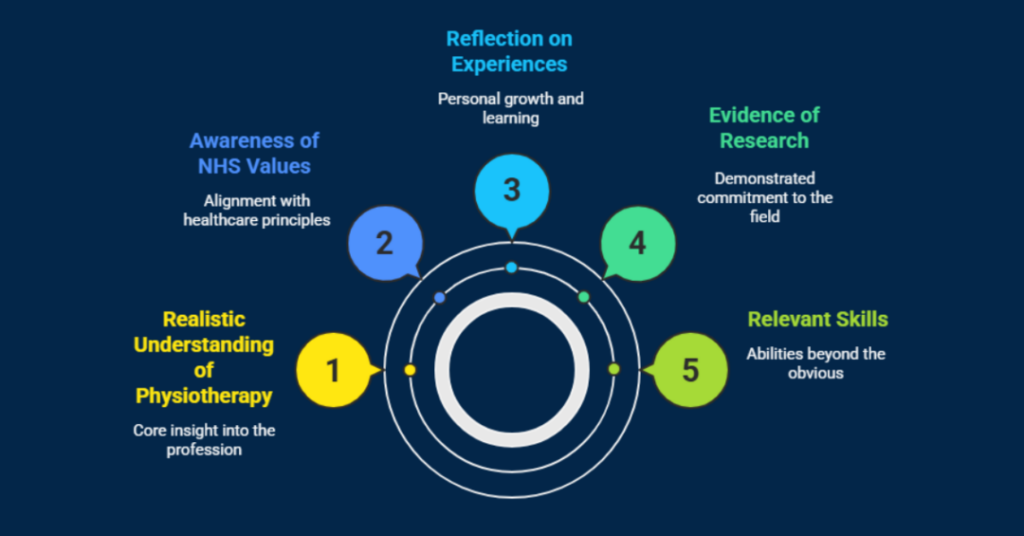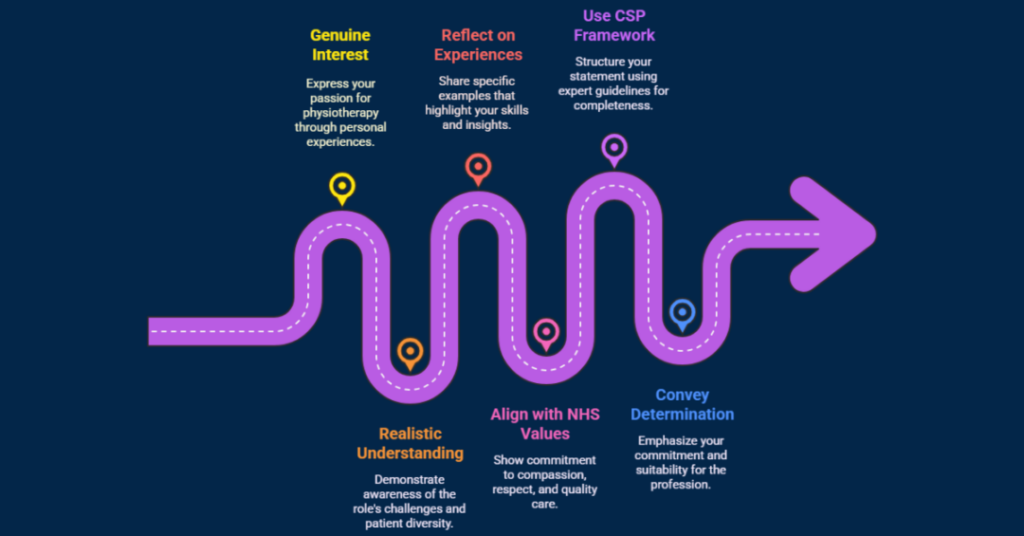23 May 2025
7 minutes read
How To Write A Physiotherapy Personal Statement (With Tips + Examples)?

Key Takeaways
- A strong physiotherapy personal statement stands out by showing real insight, relevant experience, and understanding of the profession.
- Admissions tutors expect you to demonstrate knowledge of the NHS constitution and the diverse challenges physiotherapists face daily.
- Use specific examples from voluntary work or observations to prove your skills and suitability for a career in physiotherapy.
Did you know that over 60% of physiotherapy personal statements fail to make a strong impression on admission panels? That’s because most applicants drown their story in clichés about teamwork and NHS aspirations without showing real insight or genuine work experience.
If you want your personal statement to stand out and secure your spot on the physiotherapy university course, you need to cut through the fluff and prove why you’re the physiotherapist they’re looking for.
What To Include In Your Personal Statement?
Admissions tutors have read thousands of statements just like that, and frankly, it isn’t representative of the profession or the real challenges of physiotherapy as a career. If you want to become a physiotherapist and not just tick boxes, your statement needs to show you’ve researched the career deeply, learned about the diverse range and backgrounds of patients, and can demonstrate a realistic understanding of the role—and yes, the NHS constitution and values matter here more than you think.

Here’s what you need to do:
1. Demonstrate a Realistic Understanding of Physiotherapy as a Career
Don’t just say you want to study physiotherapy—show you know what it means to become a qualified physiotherapist. Admissions tutors want to see you’ve reflected on your experiences, whether that’s voluntary work or observing physiotherapists, and how these experiences have changed your perceptions. Base your statement around the breadth of what physiotherapists do, including how they motivate patients to manage long-term recovery. This isn’t about idealized care—it’s about real challenges you’ve come to understand.
2. Show Awareness of the NHS Constitution and Core Values
The career as a physiotherapist isn’t separate from the NHS framework. You need to include how your personal values align with the six core values of the NHS constitution, such as compassion, respect, and commitment to quality care. Admissions tutors want to see you can demonstrate behaviours relevant to physiotherapy that reflect these values—this personal statement tip often gets overlooked but can set you apart.
3. Reflect on Your Experiences with Specific Examples
It’s not enough to say you have relevant skills or experience—you need to give examples that show your insights and how you reflect on what you’ve learned. Whether you attended an exploring physiotherapy event, volunteered, or observed patients, explain what you took away from these experiences. How did they shape your understanding of the profession as a whole? This reflection adds quality and depth to your personal statement.
4. Include Evidence of Research and Engagement with the Profession
Showing your interest means more than enthusiasm—you’ve got to demonstrate that you’ve actively researched physiotherapy as a career. Mention how you’ve looked into the Chartered Society of Physiotherapy or spoken to qualified physiotherapists. Admissions tutors want to see you’ve built your statement on a solid framework, not just vague interest. This shows you’re serious about a degree in physiotherapy.
5. Highlight Skills Relevant to Physiotherapy Beyond the Obvious
Yes, teamwork is important, but also consider other skills linked to the six core NHS values and the day-to-day demands of the role. For example, the ability to cope with patients who have complex conditions, show empathy under pressure, and communicate effectively with diverse patients. Include these in your personal statement to demonstrate a realistic understanding of the role—and your suitability for the career.
6 Steps To Write A Physiotherapy Personal Statement
a physiotherapy personal statement that actually grabs admissions tutors at uni requires more than buzzwords—it demands a clear, realistic understanding of physiotherapy as a career, proof you’ve researched the career and the NHS constitution, and a personal touch that shows you get what becoming a physiotherapist truly means.

Here’s a personal statement guide to help you stand out and get that qualification you want.
1. Start With Why You Want to Become a Physiotherapist
This isn’t a cheesy “I want to help people” spiel. Show your genuine interest in physiotherapy by explaining how your experiences—maybe voluntary work or attending an exploring physiotherapy event—shaped your understanding of the profession. Admissions tutors want to see you’ve researched the career and can convey your enthusiasm and determination based on real insights.
2. Base Your Statement Around a Realistic Understanding of the Role
Physiotherapy isn’t all massages and happy patients. Use your statement to demonstrate a realistic understanding of the role, including the diverse range and backgrounds of patients and the challenges they face managing long-term recovery. If you’ve observed or at least talked to qualified physiotherapists, mention how this experience changed your perceptions and reflect on what you learned.
3. Show What You’ve Learned from Your Experiences
Reflecting on your experiences is the secret sauce. Whether it’s voluntary work, observing physiotherapy sessions, or even your own experience as a patient, include specific examples that highlight your relevant skills and show your awareness of what physiotherapy involves. This insight proves your suitability for the career and your personal growth.
4. Align Your Values with the NHS Constitution
The career as a physiotherapist is deeply tied to the core values of the NHS constitution. Admissions tutors want to see that you’re able to demonstrate behaviours that align with these values—compassion, respect, and commitment to quality care. This personal statement tip is often overlooked but it shows you understand the profession as a whole and what it really demands.
5. Use the Chartered Society of Physiotherapy as Your Framework
The Chartered Society of Physiotherapy is a goldmine for anyone wanting to write a physiotherapy personal statement. Use their guidelines to structure your statement and make sure you include all the relevant points about the profession’s breadth, qualifications needed, and the kinds of situations patients face. This framework boosts your chances of being selected because it shows you know about physiotherapy from the experts.
6. Finish Strong by Conveying Your Determination and Suitability
Wrap up your statement by emphasizing your commitment to becoming a qualified physiotherapist. Show admissions tutors that you have the relevant skills and realistic understanding needed to succeed in a degree in physiotherapy and in a career as a physiotherapist. Giving examples from your experiences and reflecting on how they shaped your motivation will make your statement memorable.
What Other Documents Are Required For Admission In Top Universities?
You actually have to convince admissions tutors you’re real by submitting a stack of other documents. Think of it as your personal paperwork obstacle course, where missing one form could mean your dream degree ends up in the “nice try” pile.
If you want to stand out and avoid last-minute panics, here’s exactly what top universities expect besides your personal statement.
| Document | Purpose | Tips for Success |
|---|---|---|
| Academic Transcripts | Proof of your previous qualifications and grades | Request early; ensure they’re official and sealed |
| UCAS Application Form | Centralized form for uni applications | Fill carefully, double-check details |
| References/Letters of Recommendation | Letter of recommendation validates your character and academic potential | Choose referees who know your skills well |
| CV/Resume | Summary of relevant work experience and skills | Highlight voluntary work and physiotherapy-related roles |
| Personal Identification | Passport or ID for identity verification | Make sure it’s valid for the duration of your course |
| English Language Test Scores | Proof of English proficiency (IELTS, TOEFL) if applicable | Prepare in advance; aim above uni minimums |
| Criminal Record Check (DBS) | Ensures suitability to work with vulnerable patients | Some unis request this before admission |
| Health Clearance/Medical Form | Confirms you meet health requirements for clinical work | Schedule early, especially if you have ongoing conditions |
| Portfolio (if required) | Evidence of practical work or achievements | Only if specified, but can strengthen your application |
Best Physiotherapy Personal Statement Example That Always Work
A good physiotherapy personal statement example isn’t about imitation—it’s a blueprint that shows you how to craft your own story with clarity, honesty, and the right focus. Studying one gives you a real sense of what admissions tutors want to see—and what will get you that uni place.
Here’s what worked for many, and might for you as well:
When I first went with my grandmother to her physiotherapy sessions after her hip surgery, I thought it was just about helping her move better. But I quickly saw it was way more than that—it was about giving her back her independence and confidence. That’s when I knew physiotherapy wasn’t just a job; it was a career I wanted to be part of.
Volunteering at a rehab center opened my eyes even more. I met patients from all walks of life dealing with tough, long-term issues. Physiotherapists weren’t just fixing bodies—they were helping people take charge of their own recovery, which I found inspiring.
I’ve also had chances to talk with physiotherapists and get involved in voluntary work. That’s where I learned this job needs patience, resilience, and a real commitment to the values of the NHS. For example, helping a stroke patient showed me how important it is to tailor care to each person’s needs and encourage them every step of the way.
I want to study physiotherapy so I can build the skills to make a real difference. The course at [Uni Name] feels like the right place to turn my experiences into expertise.
I’m ready for the hard work ahead, and I’m excited to keep learning and reflecting on what it takes to be a great physiotherapist.
I’ve also come to appreciate how no two days in physiotherapy are the same. The variety of patients and challenges means you’ve got to stay flexible and curious—and I’m all in for that.
Communication really stood out to me, too. You can’t just know the exercises—you’ve got to connect with patients, build trust, and really listen. That’s something I’m keen to get better at.
And of course, physiotherapy is a team effort. I’m looking forward to working alongside other healthcare pros, all focused on what matters most—the patient.
Conclusion
Admissions tutors want to see that you understand the challenges, the diversity of patients, and the values that guide this career. If you focus on honest reflection, clear examples, and a realistic understanding of what it means to be a physiotherapist, you’ll give yourself the best chance to stand out. At the end of the day, this isn’t just a university application—it’s the first step toward a career that can genuinely change lives, including your own.
Most applicants struggle to write a perfect personal statement but end up sounding arrogant — but you won’t. At Ambitio, our AI-powered study abroad experts help you craft a powerful, standout statement that gets noticed. No fluff, no clichés—just a compelling story that proves you belong. Schedule a call with Ambitio’s experts.
FAQs
What is a Master’s in Physiotherapy?
A postgraduate program that provides advanced knowledge and skills in physiotherapy, rehabilitation, and therapeutic interventions
What are the eligibility criteria?
Typically, a Bachelor’s degree in Physiotherapy (BPT) or a related field, sometimes with prerequisite courses in anatomy and physiology, and often a minimum GPA or entrance exam
How long does the program take?
Usually 2 years (full-time), though some programs may last up to 28 months or be offered part-time
What are the specializations available?
Common specializations include Orthopaedics, Neurology, Sports, Cardiopulmonary, and Paediatrics
What does the curriculum include?
Advanced topics in anatomy, biomechanics, clinical skills, research methods, and clinical placements in real healthcare settings
Are clinical placements included?
Yes, most programs include supervised clinical placements in hospitals, clinics, or community settings

You can study at top universities worldwide!
Get expert tips and tricks to get into top universities with a free expert session.
Book Your Free 30-Minute Session Now! Book a call now




























